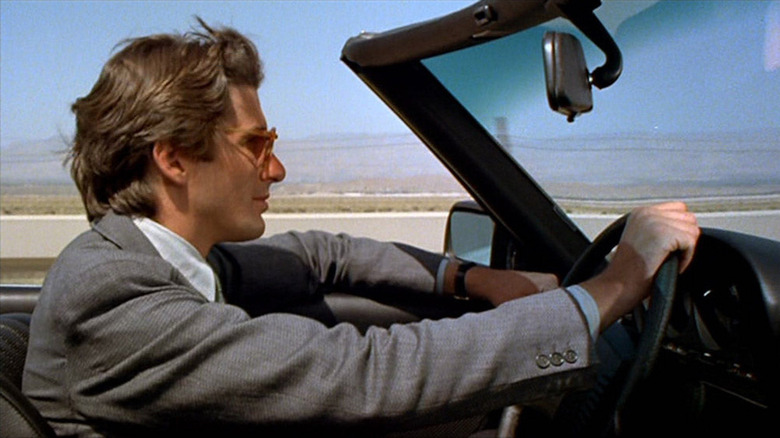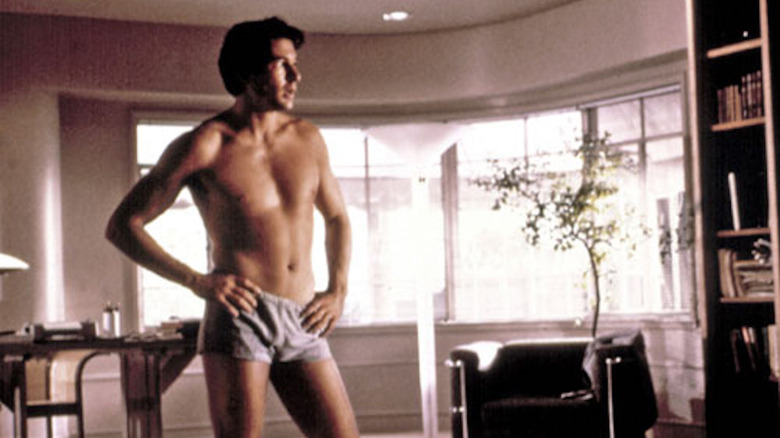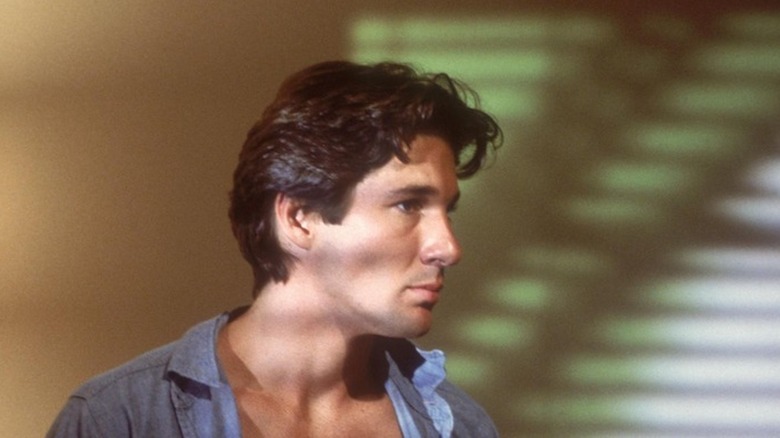The Classic Movie You Need To Watch Before American Gigolo (It's Called American Gigolo)
Paul Schrader's "American Gigolo" was the perfect movie to kick off the 1980s. The tale of a blindingly handsome, ultra-materialistic male sex worker (brought to brilliantly vapid life by Richard Gere) bedding bored, wealthy women in the hedonistic paradise of Los Angeles presaged America's headlong plunge into empty-headed excess. The smirking extravagance of Gere zipping down the Pacific Coast Highway in his drop-top Mercedes as Blondie's "Call Me" sizzles on the soundtrack, followed by a Smokey Robinson-scored montage where he casually pieces together an impeccable Armani ensemble, sold Americans on a lifestyle few could afford — including Gere's protagonist. Julian Kaye is a gorgeous, gleaming package thriving on his utility as a lover. It's a heck of a living, but his value in this field is transitory. One day, his looks will fade. That Mercedes will rust. Those threads will plummet out of fashion. And then what?
Following the lead of his Catholic filmmaking mentor, Robert Bresson, the Calvinist Schrader unceasingly tortures his transgressive protagonist through to the final reel. However, quite unlike Bresson, he gives this lurid journey an intoxicating charge. At first. Then, a half-hour in, he cuts us off, and makes us stay at the bar until last call.
Though "American Gigolo" launched the style-over-substance careers of producers Don Simpson and Jerry Bruckheimer, it is a far cry from "Flashdance." It's a coke-loaded come-on that ends in very bad sex. No one throws on "American Gigolo" for a nostalgia-fueled '80s flashback. In fact, I'm willing to wager most '80s nostalgia cases have never watched the film in its entirety. Showtime's series reboot of the property seems to be betting on this. They've eschewed the downward spiral arc in favor of a revenge narrative. Makes sense. But this is a depressing deviation from Schrader's buy-now-pay-like-hell-later prophecy.
You get what you're paid for
Gere's Julian Kaye is lousy with swagger, and, near as we can tell, a fairly lousy human being. Perhaps that's too harsh. In his defense, he is, if nothing else (and there is nothing else) intensely focused on satisfying his clients, which, given his profession, is good business. But there is nothing more on the horizon for him. He is the perfect consumer. He spends most of what he makes. He goes where his procurer (Nina van Pallandt) and pimp (Bill Duke) tell him to go, and only gets into trouble when his personal morals conflict with the general, as-dictated-by-society-and-scripture amorality of his profession. When the bottom falls out and Julian's framed for murder, the film makes it plain that he's earned his plight. Schrader's not casting judgment on Julian's chosen profession; he's simply pointing out that this is the potential cost of doing crooked business with crooked people.
Julian's only hope for exoneration rests with a married client (K Callan), which, given the moral balance of the universe he inhabits, feels a lot like divine punishment. When she refuses to help him, Julian goes straight at his pimp. It's a dumb play that forces Julian to commit the very act of which he's been credibly accused (with extra pressure being applied by Hector Elizondo's amusingly unsympathetic Detective Joe Sunday). Julian is eventually rescued by the non-client wife (Lauren Hutton) of a California state senator with whom he's fallen in love. She selflessly blows up her marriage to provide her lover with an airtight alibi. With Julian, it's always someone else paying the tab.
Bresson goes to the multiplex
Schrader specializes in severe, joyless movies. When he allows his characters to experience joy, you can rest assured there's a heapin' helpin' of retribution lurking 'round the corner. His early efforts as a writer-director are rife with the revulsion of a Calvinist trying to square the licentiousness of Los Angeles with his austere sensibilities, and, to that end, I think "American Gigolo" is the most fascinating of the bunch — primarily because his intent as a storyteller was at extreme cross purposes with his sybaritic sponsors. That pendulum can't swing any wider, and Schrader never had a wider audience. This probably worked out best for all involved. For all its glitz, "American Gigolo" has a good deal in common with the propagandistic likes of "Reefer Madness" and "Teenage Mother." Don't screw for money, kids, or this might happen to you.


